When the first incidence occurs, you may believe that your pup is just enjoying a bit of rough play. A small nip here doesn’t hurt and if they’re mouthing at their tug toys, well, that just seems like normal dog behavior. But when your dog nips, they could be over-excited, or they could be showing you a sign of more aggressive behavior to come.
What is Mouthing?
Mouthing is more common in dogs when they’re still a puppy; you may find that your dog starts mouthing at a young age. Mouthing is when a dog’s mouth and teeth are placed over an object or a person’s skin without any pressure from their teeth.
In itself, mouthing isn’t an issue and is something very natural for dogs to do. Young dogs mouth often because they explore the world with their senses. It’s similar to dogs stopping to smell everything when you take them for a walk.
You can stop a pup from mouthing and train them out of the behavior, which is especially important if they do start to apply pressure or begin getting aggressively mouthy.
Managing a Mouthing Puppy
As a puppy, your dog’s mouth will be used for just about everything. You can expect them to grab at your clothes, nip at your fingers, play-bite, and yes, mouth at things in their surroundings. All of these are normal behaviors that exist in all puppies as they’re exploring the world. As puppies, they have little to no impulse control over their actions, which is why starting training from an early age is best.
Happy and calm dogs will repeat behaviors that they believe are rewarding to them. That’s why a dog will continue to do something you find unfavorable after you’ve asked them to stop – your pup realizes that you’ve paid attention to them, and that’s a reward to their minds. The more you yell, move away, or push at them, the more they’ll think that it’s time to play and that they’ve done the right thing to get you to play with them.
A dog will learn through our reactions to their behaviors. There are some pets that are naturally higher energy than others, such as the Cattle dog breed. These breeds are likely to be mouthier than others because they’re doing everything they can to get rid of their excess energy. Other dog breeds may not be as mouthy.
To get rid of mouthing behavior in a dog, most dogs respond to their owners changing the way they react to the mouthing. Moving away from your dog is the first step to stop your dog from mouthing at you. From there, turn your face from them, do not acknowledge them, and walk out of the room.
If you must, you can use a closed-door as a barrier. This will stop your pup from following you when they start acting up. Be a step ahead of your pet and you should have the good luck to curb this behavior while they’re still young.
Provide your dog with pet toys, such as interactive toys and indestructible toys, or maybe a snuffle mat, that they can mouth on if they seem to be getting excited. Any toy that your pet likes is sure to get their attention and stop them from tugging at you and your clothes. If you need to quickly get your dog to stop mouthing, toss food or treats for them to focus on instead.
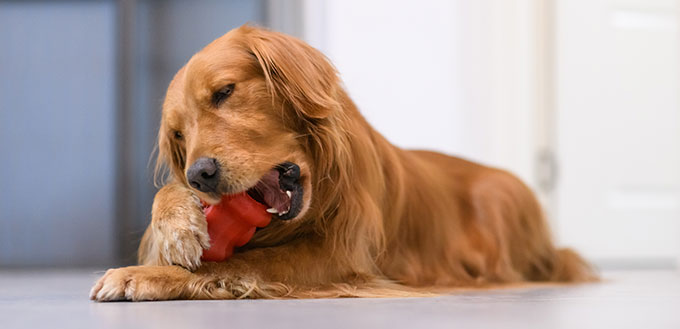
What is Nipping and Why is My Dog Doing It?
Nipping occurs when your dog quickly bites at you with the edge of its teeth. It’s not quite a dog bite and nipping shouldn’t do more than pinch your skin.
A puppy nipping people isn’t unusual, but as your pup gets older, it can become a problem behavior. An adult dog has sharper, stronger teeth, and may not be aware of its own physical strength. The last thing you want is a trip to the ER because your pup has bitten you.
Puppies nip because they’re excited. When they play, they use all of their senses and the different parts of their body to fully immerse themselves in their environment. Young pups will get excited fast, and when they’re excited, they nip, spin around, bark, and get underfoot.
Other Reasons a Dog is Nipping
New House Guest
Been the victim of a dog nip or had visitors who have? Dogs may nip at new house guests while they’re visiting because strangers make them nervous. If the visitor has been before and your pup is getting familiar with them, your dog could be nipping them because they’re excited to see that person.
It’s a bit of a gray area, so you should try to observe your pet while that person is visiting. If they spend a lot of time trying to get the person in question’s attention, then they’re excited. If they are showing fearful or nervous behavior, you may want to consider having your guest get down to your dog’s level, offering them a treat, and allowing your pup to see that they aren’t a threat.
Dog Bite Inhibition
When a puppy has no littermates or doesn’t spend enough time with the rest of their litter, they don’t learn bite inhibition. This early time in their life is the period that dogs learn how hard they can bite or nip without hurting another littermate. The other puppy on the receiving end will yelp loudly or otherwise show the biting puppy that they’ve bitten too hard, which teaches the pup not to bite that hard next time.
How to Stop a Dog From Nipping When Excited
Stop your dog from nipping at you by employing the use of distracting chew toys and behavior training. You should follow the same advice to stop a pup from nipping as the method laid out to stop a puppy from mouthing.
You can also use dog chews to distract or calm your pet down. Chews and soft, chewable toys are great tools to relax a dog and keep them happy without adding to their excitement levels. If your dog isn’t overly excited, you can help them burn off their energy in other ways.
Take a look at our review of calming chews for dogs.
Get Rid of Excess Energy
Dogs can be very excitable. This leads them to mouth and nip anyone and anything they are near. When your dog has a lot of energy to burn off, consider taking some time to play with them. Fast and low-effort games include using a tug of war rope and choosing a dog ball to play fetch with.
If you have more time on your hands, try to go on a walk with a long leash to help your dog feel like they have more freedom to play and explore. A dog park is an excellent place to take them because they have the opportunity to play with other dogs that can handle their kind of rough play.
You can also leave your pup with a chewy treat that will keep them busy for a while. Dental chews and sticks work great for this, and you’ll have the added benefit of the treat cleaning your dog’s teeth. Treats and chews are not a way to stop nipping, but they can work as a taste deterrent that is pleasant.
Do not use treats to reward mouthing or nipping! Only give your pup a treat once they’ve stopped mouthing at you or listened to your commands to stop.
Take a look at our guides on the Best Dog Treats, Best Dental Chews and Best Bully Sticks.
Play Biting and Dog Nipping
Mouthing, nipping, and biting are all very different behaviors in a pup, but they can seem extremely similar.
Mouthing occurs when your furry friend puts their mouth around you or an object but does not apply any pressure with their teeth.
Nipping is a pinch that happens when your pup uses their front teeth to lightly bite at your skin or clothes.
Both mouthing and nipping can be considered playful behavior that should not harm you or the object your dog has their mouth on.
Biting, however, can be a few different levels. A dog applying slight pressure with their teeth may be play biting – this can be identified by your dog being quick to let go or leaving their mouth around your hand or arm without applying pressure. Aggressive and hard biting is where the issue lies.
Is Your Dog Trying to Self-Soothe?
When you are giving your dog attention in the form of pets, check for any thin fur patches. Overgrooming often includes dogs nipping at their own fur and skin due to stress or environmental factors such as allergies. If you find nothing like that, your dog could still be self-soothing.
Self-soothing is when a pup tries to calm themselves down. You may need to visit your local vet who can provide veterinary advice on how to ease your dog out of this behavior. To start with, buy your pup an interesting dog toy (or several), as well as some treats and boredom-beaters. Introduce any new items to your dog slowly, and observe them over the course of their day to see if there’s anything that might be stressing them out.
Identify self-soothing by looking for these signs:
- Biting at their fur or skin
- Shaking off as if they were wet
- Licking their lips
- Staring off to the side
- Not responding to you
- Scratching
- Spinning repeatedly
- Making distressed noises
- Whimpering
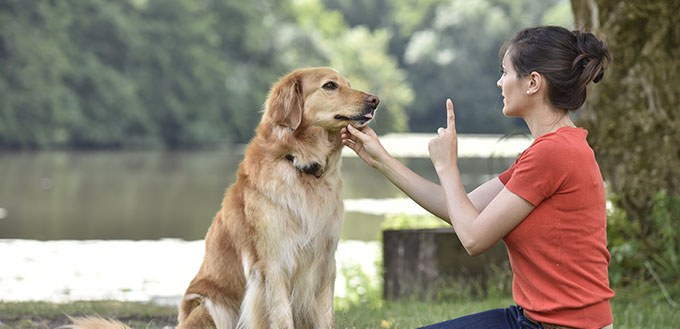
How to Train a Mouthy Dog
Mouthy behavior can be trained out of a dog. Playful mouthing is fine if your pup does it occasionally, but excessive mouthing may require obedience training and potentially veterinary advice. You don’t want to wait to train out this behavior.
In fact, the moment your dog’s teeth touch your very human skin for the first time in a non-playful way, you should consider starting their training. Yes, while they’re a puppy. Puppies tend to learn faster than older dogs, and you don’t want to wait until their teeth get stronger.
If your pup becomes overly excited, it’s possible he’ll start to nip or mouth at you again while you’re training the behavior out of him. Stop whatever it is you’re doing together and only resume play once your dog has calmed down. You have to teach your pup to stop exhibiting unsocial behavior the moment he starts biting at you.
When you stop playtime because of a bite or nip, go to another room away from your dog. You can shut a door or put up a baby gate to stop them from following you, but you must follow through with your actions so that they know you aren’t happy with them.
You may also like our review of gates for dogs.
Have faith in your best friend’s ability to learn and adapt.
Training Games: Hand Target
The Hand Target method is a game you can use to train many dogs. For this type of training, your furry friend will learn to press their nose to your palm when you give them the signal to do so.
This trick allows your dog to refocus on their surroundings, while also giving you, their owner, back your command of them. It’s great to teach your dog because you’ll be able to get their attention in mere moments, and stop your pet from doing things you’d rather they not be doing.
Training your pet to complete this trick is perfect if you have young children because that will give your adult dogs and young pups more targets to focus on during training, which means they’ll eventually learn to listen to (or be commanded by) the entire family.
What Not to Do
Only reward good behavior, but don’t give in to your frustrations if your dog does start biting again. Positive reinforcement is the key to success with animals.
Negative punishment for bad behavior or aggressive behavior, like shouting at your dog, is just going to make them either act out or be scared of you. That’s a one-way ticket to aggressive biting rather than simply excited nipping, and you’ll have no one to blame but yourself. Exhibit calm behavior, and your dog will learn to follow your lead.
In addition to avoiding negative reinforcement, you should also not use anything to keep your dog’s muzzle closed. There’s no need for it, and it can be very cruel. If your dogs bite you, think about why they might be doing that and work with them to change their behavior by calling in a professional dog trainer for help.
Why Dog Trainers Can Help
A certified professional dog trainer can help train your pet out of negative behaviors like nipping, biting, and mouthing. You can certainly attempt to train your dog at home, but there’s nothing wrong with getting a professional helping hand from someone local who has experience training all breeds of dog.
Trainers can give you the tools that you need to teach your dog commands, while also helping you learn how to keep control of your pet in social situations. The advice they offer is invaluable.
FAQs:
Q: Why does my dog bite me when excited?
A: When your pet is biting you during a period of excitement, what they’re really trying to do is get your attention. Littermates will often bite each other during play and it is during this time that they learn how hard to bite. Your dog is just trying to get you to be excited with them.
Q: How to stop my dog from biting when excited?
A: Follow the same training methods outlined to stop your pet from mouthing and nipping at you. Ignoring a pup when they start biting is the first step to getting them to understand that it isn’t acceptable behavior to you.
Q: Why shouldn’t I push my dog down?
A: Pushing your dog or performing what is known as an “alpha roll” is a way of forcing your dog to do what you want them to. It’s old and outdated, and it can make your dog less likely to listen to you in the long run. Research has even proved that it’s ineffective as a punishment or training technique.


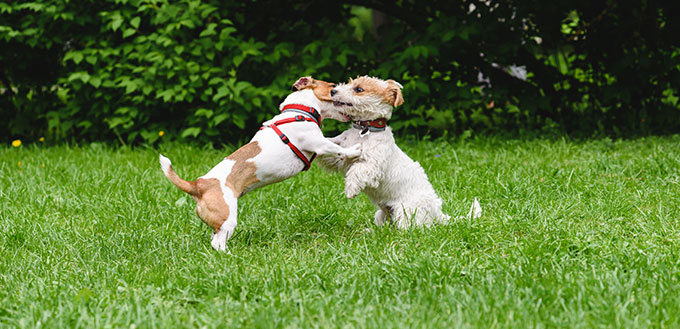



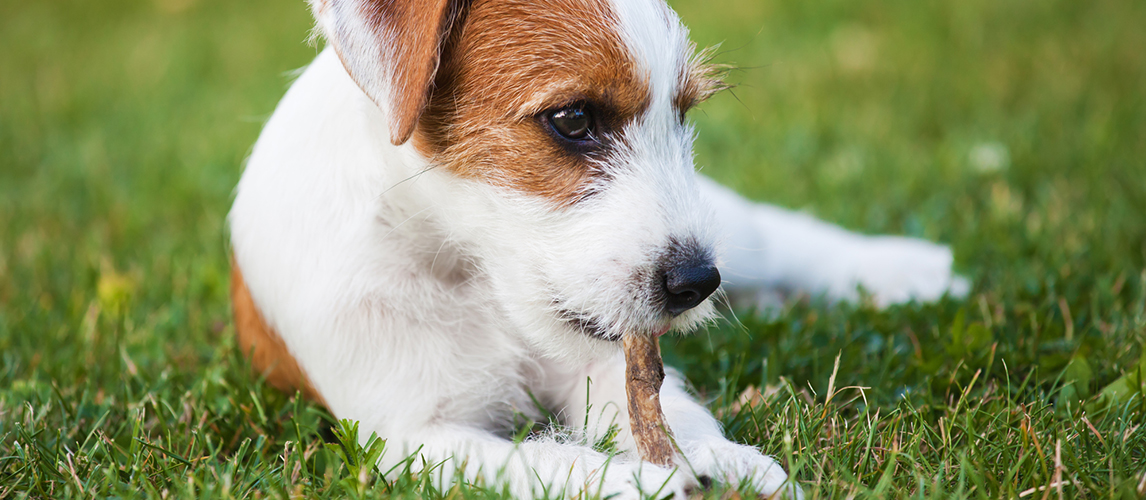
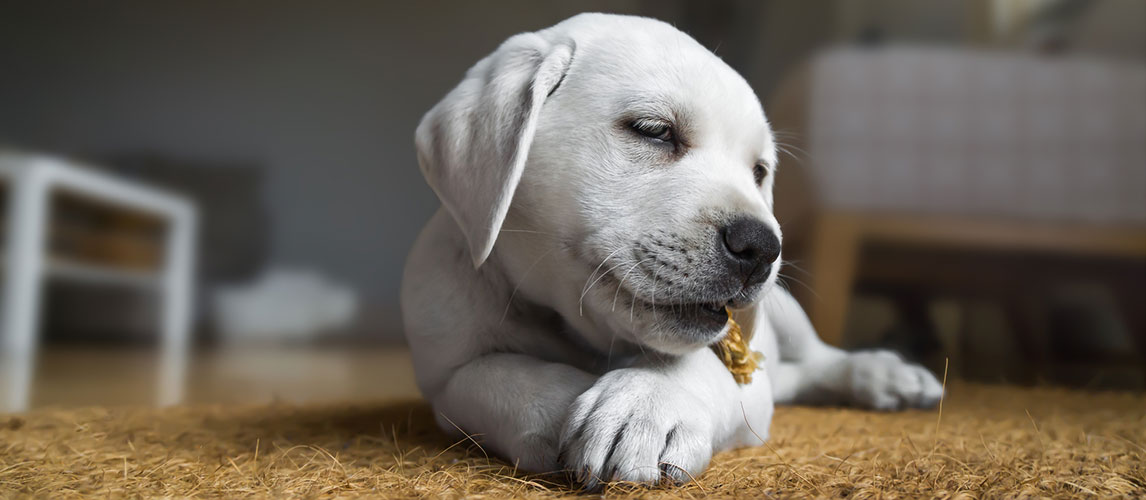
I will def.try this, thanks.